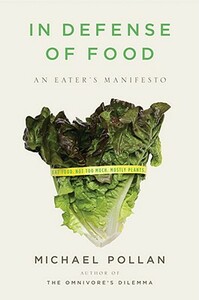Take a photo of a barcode or cover
In this thought-provoking discussion of food, Pollan addresses the American obsession with food and dieting, discussing the enormous amount of time that many people spend thinking about what they should eat. He makes a solid and important point: there is so much about food, what it consists of, and how it interacts with our bodies that we do not yet fully understand. As Pollan takes the reader through some of our cultural food history and what we think we know about what sustains us, the reader is left with some great ideas to consider about what food really is.
-Kelly M.H.-
-Kelly M.H.-
informative
slow-paced
informative
reflective
medium-paced
I found the writer sanctimonious and completely ignorant to the economic factors that make his approach untenable for something like 50% of Americans.
The best part of this book is the last section, which breaks down how to identify the food you should be eating. The first 80% is scary enough to give you a food phobia, or at least a phobia of what we call food these days.
It took a few chapters to really get on board with Pollan's writing style, but once I did I became fascinated with the facts presented and suggestions given. What sums it up best for me is this line, from the last chapter: "...in our time cooking from scratch and growing any of your own food qualify as subversive acts." This book takes the idea of our fast food nation and breaks down, step by step, how we came to this place. A good majority of the book discusses nutritionism and why/how this ideology has actually led to less healthy citizens.
Highly suggest this read for anyone who is skeptical about the place to which food as be relegated in American culture, anyone willing to reevaluate their relationship with food, anyone even remotely of the mind that food is much more than just nutritionism.
Highly suggest this read for anyone who is skeptical about the place to which food as be relegated in American culture, anyone willing to reevaluate their relationship with food, anyone even remotely of the mind that food is much more than just nutritionism.
I'm definitely seeing overlap in Pollan's opinions and sources from book to book. I enjoyed this book more than Omnivore's Dilemma, and I think it's a better assembled thesis. Would recommend.
This was a surface treatment around the complex relationships between society and food. While his points were valuable, my primary gripe is that he appears to write from a position of privilege and doesn't really address the tangled nature of socioeconomic status and access to *real* food. (By "access," I mean both real physical access (i.e., food deserts) and psychological (i.e. Bordieu's habitus).)
Of course, I am writing this while Newark mayor Cory Booker is in the midst of his food stamp challenge. So, maybe I have my own privilege here in some ways in terms of hindsight and/or revisionism. (This book was written in 2008. I am not sure the concept of "food desert" was even born then.)
This book is certainly an attack on large scale food industry and nutritionism. I had not given much thought to the idea that our food has been made whole again through nutritional "enhancements" of varying sorts.
Then again, I grew up with a mother who would drive great distances on weekends to buy vegetables from the back of a farmer's truck on the side of a rural highway (impromptu vegetable/fruit stand) and then to a shell covered parking lot to buy fish that was fresh out of the gulf. At least, I grew up shopping the perimeter of the grocery store. Processed junk wasn't part of my upbringing.
This book refreshed my perspective. For example, the other day I was eating a brand name peach yogurt. As I ate it, I thought to myself, "Just because it contains peaches, should it actually be peach in color?" Why would something that is supposed to *taste* like peaches also need to appear peach in color? It was an unnatural shade of "peach"--almost salmon-colored. What is going on here? Pollan's got his theories and even offers strategies for enhancing our eating patterns. What he doesn't go near is how we might combat the industry that keeps selling this junk.
Of course, I am writing this while Newark mayor Cory Booker is in the midst of his food stamp challenge. So, maybe I have my own privilege here in some ways in terms of hindsight and/or revisionism. (This book was written in 2008. I am not sure the concept of "food desert" was even born then.)
This book is certainly an attack on large scale food industry and nutritionism. I had not given much thought to the idea that our food has been made whole again through nutritional "enhancements" of varying sorts.
Then again, I grew up with a mother who would drive great distances on weekends to buy vegetables from the back of a farmer's truck on the side of a rural highway (impromptu vegetable/fruit stand) and then to a shell covered parking lot to buy fish that was fresh out of the gulf. At least, I grew up shopping the perimeter of the grocery store. Processed junk wasn't part of my upbringing.
This book refreshed my perspective. For example, the other day I was eating a brand name peach yogurt. As I ate it, I thought to myself, "Just because it contains peaches, should it actually be peach in color?" Why would something that is supposed to *taste* like peaches also need to appear peach in color? It was an unnatural shade of "peach"--almost salmon-colored. What is going on here? Pollan's got his theories and even offers strategies for enhancing our eating patterns. What he doesn't go near is how we might combat the industry that keeps selling this junk.
informative
inspiring
reflective
medium-paced




